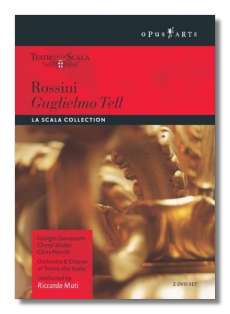|
Back
04/13/2012
Gioachino Rossini: Guglielmo Tell
Giorgio Zancanaro (Guglielmo Tell), Cheryl Studer (Matilde), Chris Merritt (Arnoldo), Amelia Felle (Jemmy), Luigi Roni (Gessler), Giorgio Surjan (Gualtiero Farst), Franco DeGrandis (Melchthal), Ludicana D’Intino (Edwige), Alberto Noli (Leutoldo), Ernesto Gavazzi (Rodolfo), Vittorio Terranova (Ruodi), Ernesto Panariello (A Hunter), Carla Fracci & Alessandro Molin (Solo Ballerinas), Corps de Ballet, Orchestra and Chorus of Teatro alla Scala, Giulio Bertola (Chorus Director), Riccardo Muti (Conductor), Luca Ronconi (TV and Stage Director), Gianni Quaranta (Set Designer), Vera Marzot (Costume Designer), Vannio Vanni (Lighting Designer), Flemming Flindt (Choreographer), Giuseppe Rotunno (AIC) (Photographs)
Recorded live at Teatro alla Scala, Milan (December 14, 1988) – 240'
Opus Arte #: OA LS3002 D – Booklet in English, libretto in Italian. Subtitles in English

   
Gioachino Rossini’s monolithic masterpiece may not be considered by some to be his ultimate pièce de résistance, but Guglielmo Tell is without question the final seam in stitching up his operatic career. Like a rich fabric, sophisticatedly sequined, Guglielmo Tell was Paris’ theatrical haute couture of its time and the first completely French opera by Rossini. The successful premiere of Guglielmo Tell on August 3, 1829 satisfied all requisites within The Opéra’s stringent guidelines, yet the clever Rossini deftly infused an Italianate vein to assuage his fellow countrymen, ultimately placating both sides. Guglielmo Tell is a remarkable achievement, and this chapter from Opus Arte’s La Scala Collection is a find worth having.
The thunderous applause during the curtain calls affirms a warm reception of Luca Ronconi’s production. All principals execute exceptional skill, but it’s to the credit of conductor Riccardo Muti for pulling together all the operatic components. The charismatic force of Mr. Muti’s no-nonsense, business-like approach permeates La Scala’s Orchestra, Chorus and Corps de Ballet with striking results. At the conclusion of a vibrant rendition of the easily recognizable Rossinian overture, Guglielmo Tell opens to hymnal strains from the chorus as they slowly filter into Gianni Quaranta’s quasi Shakespearean Globe amphitheater. The tiered structure commingles with a series of moving panels encapsulating a mélange of highly cinematic Helvetian scenery. A bit ahead of its time, the confluence of film and stage is astounding.
“Buttery and bold” aptly describes the sound originating from Giorgio Zancanaro. He is the personification of the legendary Swiss hero who is greatly revered by son, Jemmy, interpreted with brilliant fortification by Amelia Felle in which she tackles some of the highest notes in the score with tremendous ease and unflinching presence. Likened to the mellifluous luminescence of Montserrat Caballé but cloaked with a slightly shallower timbre, Michigan native Cheryl Studer commands a dignified presence and handles the stringent demands of Matilde with powerful fluency. Teamed with Chris Merritt’s shining vocal display in the role of Arnoldo, their Act II duet (“Tutto apprendi o sventurato”) is sublime. Austrian oppression is spearheaded by Luigi Roni who exemplifies the dictatorial approaches of the Hapsburg governor, Gessler, while Giorgio Surjan’s Gualtiero Farst generates patriotic fervor with a crescendo conclusion in the Act II trio “Allor che scorre” alongside Guglielmo and Arnoldo.
Though too many to cite in this review, the variety of ensembles and choral parcels are effulgent despite the seemingly static crowd displays. Guglielmo Tell has its moments of languor including the drawn out patriotic choral section ending Act II, yet Act I brackets marvelous, energetic scoring. The “Calvary Charge” finale, brings to mind Meyerbeerish influences, and it is one of the crowning moments of the opera. The unfolding of events in Act III, Scene II which ultimately cause Guglielmo to shoot an arrow through the apple atop Jemmy’s head has a wave of frisson and comes closest to an entrée into a sampling of the opera’s verismo value.
The expected ballet has no relevancy within Guglielmo Tell and disrupts the plot, but it, nonetheless, merits a few words. The late Flemming Flindt, trained soloist with the Royal Danish Ballet, choreographed the dances which are grounded by a predominant Bournonville technique with the trademark intricate footwork and characteristic épaulement. As a stand-alone, the La Scala Corps de Ballet displays magical aesthetics, and the pairing of solo ballerinas, Carla Fracci and Alessandro Molin, demonstrates agility and grace in their pas de deux and solo segmentations.
A subdued color pallet surrounds Vera Marzot’s authentic costuming that pleases and adds potent value to the production. Formal Swiss attire is replicated in the marriage procession from Act I and the Hapsburg soldiers’ breastplates and helmets are outstanding. Creating the right mood to intensify Rossini’s music is masterfully controlled through Vannio Vanni’s lighting.
Requirements for staging Guglielmo Tell are extensive, elaborate and costly, and live performances don’t come along frequently enough. This places greater significance in this Opus Arte release. Immeasurable mightiness, spectacular grandeur, classic orchestration, resounding singing, this Guglielmo Tell deserves four stars.
Christie Grimstad
|